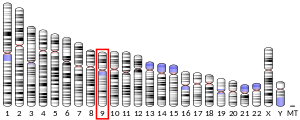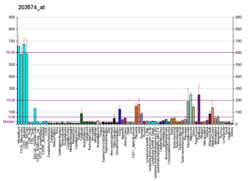NFIL3
Appearance
Nuclear factor, interleukin 3 regulated, also known as NFIL3 or E4BP4 is a protein which in humans is encoded by the NFIL3 gene.[5]
Function
[edit]Expression of interleukin-3 (IL-3) is restricted to activated T cells, natural killer (NK) cells, and mast cell lines. Transcription initiation depends on the activating capacity of specific protein factors, such as NFIL3, that bind to regulatory regions of the gene, usually upstream of the transcription start site.[5][6]
References
[edit]- ^ a b c GRCh38: Ensembl release 89: ENSG00000165030 – Ensembl, May 2017
- ^ a b c GRCm38: Ensembl release 89: ENSMUSG00000056749 – Ensembl, May 2017
- ^ "Human PubMed Reference:". National Center for Biotechnology Information, U.S. National Library of Medicine.
- ^ "Mouse PubMed Reference:". National Center for Biotechnology Information, U.S. National Library of Medicine.
- ^ a b "Entrez Gene: NFIL3 nuclear factor, interleukin 3 regulated".
- ^ Zhang W, Zhang J, Kornuc M, Kwan K, Frank R, Nimer SD (November 1995). "Molecular cloning and characterization of NF-IL3A, a transcriptional activator of the human interleukin-3 promoter". Molecular and Cellular Biology. 15 (11): 6055–63. doi:10.1128/mcb.15.11.6055. PMC 230857. PMID 7565758.
Further reading
[edit]- Cowell IG, Skinner A, Hurst HC (July 1992). "Transcriptional repression by a novel member of the bZIP family of transcription factors". Molecular and Cellular Biology. 12 (7): 3070–7. doi:10.1128/mcb.12.7.3070. PMC 364521. PMID 1620116.
- Zhang W, Zhang J, Kornuc M, Kwan K, Frank R, Nimer SD (November 1995). "Molecular cloning and characterization of NF-IL3A, a transcriptional activator of the human interleukin-3 promoter". Molecular and Cellular Biology. 15 (11): 6055–63. doi:10.1128/mcb.15.11.6055. PMC 230857. PMID 7565758.
- Matoba R, Okubo K, Hori N, Fukushima A, Matsubara K (September 1994). "The addition of 5'-coding information to a 3'-directed cDNA library improves analysis of gene expression". Gene. 146 (2): 199–207. doi:10.1016/0378-1119(94)90293-3. PMID 8076819.
- Cowell IG, Hurst HC (September 1996). "Protein-protein interaction between the transcriptional repressor E4BP4 and the TBP-binding protein Dr1". Nucleic Acids Research. 24 (18): 3607–13. doi:10.1093/nar/24.18.3607. PMC 146135. PMID 8836190.
- Ikushima S, Inukai T, Inaba T, Nimer SD, Cleveland JL, Look AT (March 1997). "Pivotal role for the NFIL3/E4BP4 transcription factor in interleukin 3-mediated survival of pro-B lymphocytes". Proceedings of the National Academy of Sciences of the United States of America. 94 (6): 2609–14. Bibcode:1997PNAS...94.2609I. doi:10.1073/pnas.94.6.2609. PMC 20136. PMID 9122243.
- Hulme DJ, Blair IP, Dawkins JL, Nicholson GA (June 2000). "Exclusion of NFIL3 as the gene causing hereditary sensory neuropathy type I by mutation analysis". Human Genetics. 106 (6): 594–6. doi:10.1007/s004390000306. PMID 10942106.
- Ozkurt IC, Tetradis S (July 2003). "Parathyroid hormone-induced E4BP4/NFIL3 down-regulates transcription in osteoblasts". The Journal of Biological Chemistry. 278 (29): 26803–9. doi:10.1074/jbc.M212652200. PMID 12743120.
- Priceman SJ, Kirzner JD, Nary LJ, Morris D, Shankar DB, Sakamoto KM, Medh RD (June 2006). "Calcium-dependent upregulation of E4BP4 expression correlates with glucocorticoid-evoked apoptosis of human leukemic CEM cells". Biochemical and Biophysical Research Communications. 344 (2): 491–9. doi:10.1016/j.bbrc.2006.03.169. PMC 2763529. PMID 16630563.
This article incorporates text from the United States National Library of Medicine, which is in the public domain.





